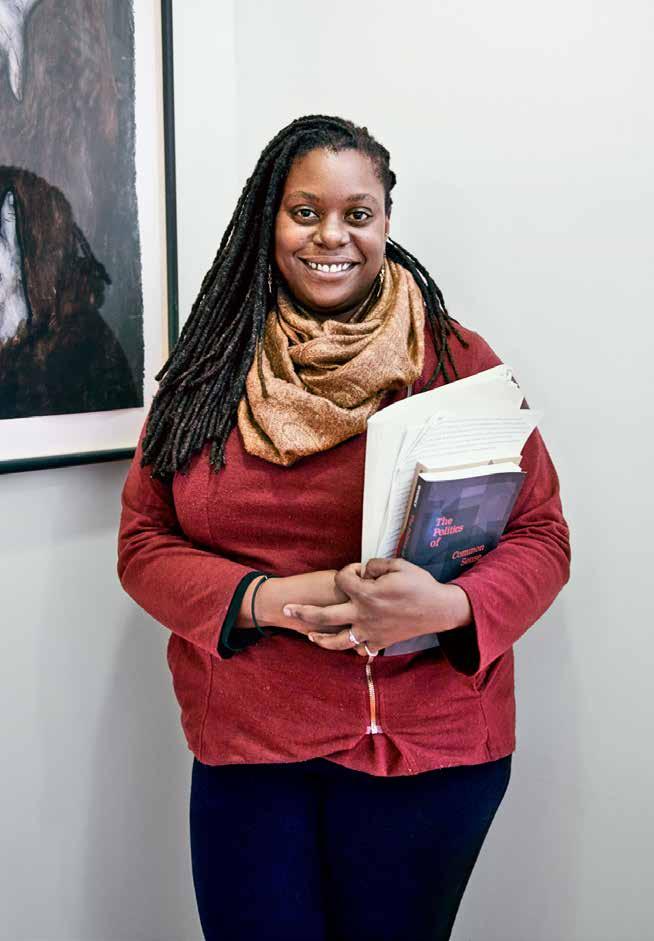
6 minute read
Politics
from 2020 NSSR Viewbook
I. OVERVIEW
II. DIALOGUES



Politics Overview
To study politics is to study power. The Department of Politics at The New School for Social Research (NSSR) takes a distinctive approach to the study of politics, emphasizing political theory, political economy, and the challenges of democracy. Courses in American, global, and comparative politics focus on the historical roots of contemporary political forces. Ongoing faculty research looks at topics including grassroots politics in the United States, Russia’s relation to Ukraine, Indian party politics and law, climate change in the Himalayas, migration and deportation in the Pacific and Australia, and the political pressures of civil society in China.
The department actively participates in the interdisciplinary intellectual life of NSSR, including the activities of the Heilbroner Center for Capitalism Studies, the India China Institute, the Zolberg Institute on Migration and Mobility, and the online platform Public Seminar.
Students who go on to doctoral study gain proficiency in two of the four areas of instruction offered by the department: American politics, comparative politics, political theory, and global politics.
Students in the Department of Politics also belong to the broader community of The New School for Social Research, which gives them access to a wide array of extracurricular lectures, conferences, and seminars. Interactions with scholars from different regions, with unique perspectives and fresh ideas, make the study of politics at NSSR an academically enriching, personally gratifying experience.
Degrees Offered
The Department of Politics offers MA and PhD degrees. Students who complete MA requirements with sufficient distinction may be considered for admission to PhD study. In rare cases, the department grants direct PhD admission to applicants who have completed a comparable MA in Politics at another institution. Students with an MA in Historical Studies, Sociology, or Politics from The New School for Social Research or an MA in History or Politics from another institution may apply to study in the PhD program in Politics and receive their PhD while adding a specialization in Historical Studies.
Recent Courses
Global Political Economy: History and Theory Transnational Border Lab States and Markets in China Modern Political Thought: Life of Politics Social Movements Postcolonial and Feminist Theories of International Relations
Recent Outcomes
Jan Dutkiewicz (PhD ’18): Caplan Postdoctoral Fellow, Johns Hopkins University Brandon Koenig (PhD ’18): Assistant Professor, Franklin & Marshall College Howell Williams (PhD ’17): Assistant Professor, Western Connecticut State University Alix Jansen (MA ’16): Doctoral Student, University of Toronto Nahema Alexia Marchal (MA ’16): Content Editor, Dow Jones Claudia Sampson (MA ’16): Chief Diversity Officer, NYC Department of Finance Hjalte Lokdam (MA ’14): Doctoral Student, London School of Economics

The Power and Passion of Discourse
Deva Woodly Associate Professor of Politics
Drawing from political science, economics, sociology, and anthropology, Deva Woodly emphasizes, “I’m a heterodox thinker. My work is interdisciplinary in and of itself.” She aims to move away from the formality of creating an interdisciplinary educational experience and instead naturally and effortlessly expose students to the whole breadth of sources. As she frees herself from traditional siloed thinking, she encourages her students to do the same and strive for rigor as the ultimate standard.
When people talk, Deva Woodly listens, and not just to individuals, but to groups, too. She analyzes how people articulate their own situations, how they see the world, and how these discourses circulate online. The examination of the discourses of ordinary people reveals how their words and ideas affect the political sphere and shape our views of what is possible.
The cornerstone of Woodly’s work is the question of how individuals come to view their place in various groups and how these groups can mobilize into effective social movements. In her research, she tracks the way movements since the late 20th century have used blogs and social media to create spaces for selfarticulation, frame messages to the wider world, and spur individuals to action. Woodly studied this topic as a 2019–2020 fellow-in-residence at the Edmond J. Safra Center for Ethics at Harvard University.
Woodly is quick to note that social media is not a panacea, but it has been a useful tool for movements savvy enough to realize that it is a dynamic means of communication rather than a substitute for old-fashioned face-to-face organizing. Ultimately, Woodly wants her work to help people understand how powerful they are and how to use that power to do good.
Passionate students with a keen interest in a particular field or area of study excite Woodly. As a scholar who combines empirical and theoretical methods in her own work, she encourages her students to do the same, by exposing them to the thinkers or data that will add another dimension to their work. Woodly feels that this combination is the very definition of praxis. Interested in knowledge for its uses, she hopes theory and data will help students develop their creative problem- solving capacities and lead them to new kinds of meaning and social change.

A Sustainable Movement to Interrogate Capitalism
Nancy Fraser Henry A. and Louise Loeb Professor of Political and Social Science
Nancy Fraser believes that the way to interrogate a system like capitalism that infiltrates every aspect of modern life is through an interdisciplinary lens. Through her research, she examines three institutions: public power, or the state and legal authority; social reproduction, the unwaged domestic work done in families, neighborhoods, and communities that supports paid wage labor; and sustainable ecological infrastructure, in order to consider the contradictory relationships the first two institutions have to the dominant economy.
Never one to work in a vacuum, Fraser says her best ideas arise in an environment of discussion and exchange. She currently writes and presents a series of essays that lay out her critique of capitalism in tandem with notions like the relationship between free wage labor and capitalism’s historic dependence on slavery and colonial subjugation. In addition, Fraser and Rahel Jaeggi coauthored Capitalism: A Conversation in Critical Theory (Polity), a book that delves into the strengths and weaknesses of each scholar’s theories on capitalism. Along with NSSR colleague Cinzia Arruzza and Tithi Bhattacharya, she also wrote Feminism for the 99%: A Manifesto (Verso).
Although her ideas rely heavily on a theoretical framework, Fraser reaches beyond the academy to the public at large. She eschews the mainstream political establishment in favor of social movements that grapple with deep societal ills. A participant in and student of the movements of the 1960s, Fraser has always been interested in how movements start and, more important, how they can be sustained over a long period of time. Fraser advocates for an institutionalized structure to maintain movements’ energy and momentum— a view with which many of her students disagree. This disagreement doesn’t dampen the debate, however; it strengthens it by forcing Fraser and her students to ask more questions.
For Fraser, NSSR’s passionate and intellectual student body makes the school the only place she could see herself teaching. As a graduate student in New York City in the 1970s, she often attended seminars at NSSR and was struck by the intensity of the scholarship at the school. Years later, when she had the chance to join the faculty, Fraser did not hesitate. She prides herself on being a part of a politics department that stresses theory, conceptual debate, and intellectual critique. The environment forces students to think deeply and critically about how to conceptualize problems. Fraser, in turn, helps her students construct their own voices as writers and thinkers, to convey why a particular problem is of importance to them and how their approaches differ from those of other scholars.









